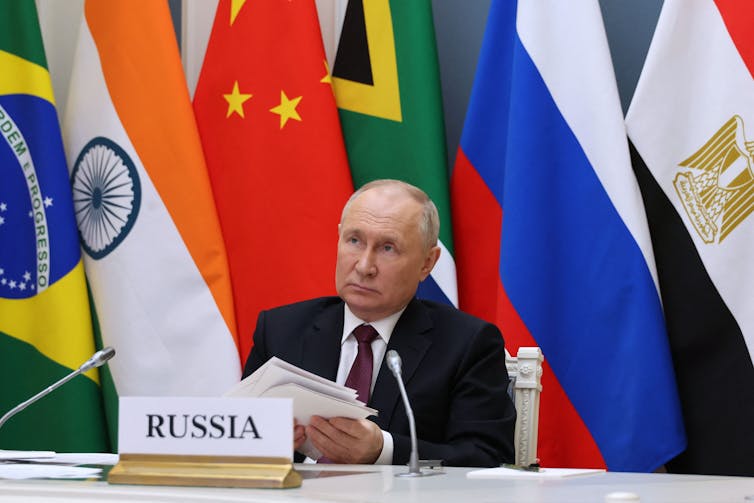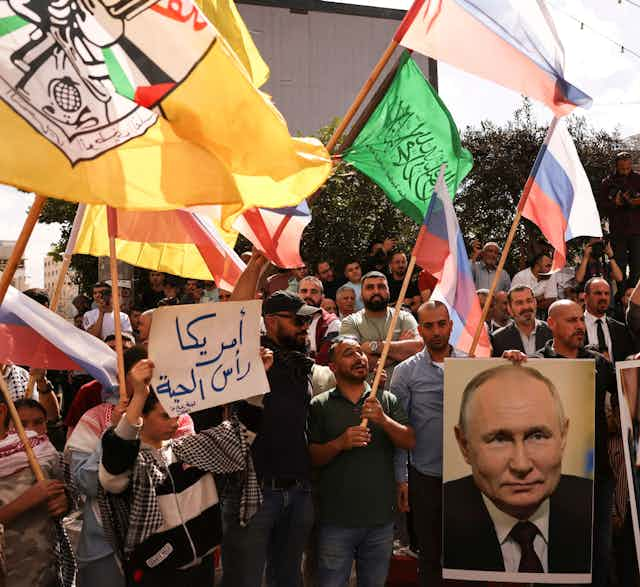The war in Gaza isn’t only challenging the geopolitics of the Middle East: It is also complicating matters in Ukraine, as Russia seeks to capitalize on growing anti-Israeli sentiment in the Global South.
Russia was slow to condemn the Oct. 7 attack in Israel and has hosted a succession of Hamas delegations in Moscow. It also works closely with Iran, Hamas’ main sponsor.
Meanwhile, U.S. backing for Israel is further eroding support for Ukraine in the Global South, amid accusations of double standards over how the West views the plight of civilians in the two wars.
As an expert on modern Russia, I see deeper dynamics at work. Putin’s stance on the Israel-Hamas conflict feeds into a narrative of using antisemitism to disparage perceived enemies and defend Russian actions: a tactic that has deep historical origins in the Soviet Union and czarist Russia.
‘A century of antisemitism’
The Gaza war erupted at a crucial moment in the conflict in Ukraine. Ukraine’s counteroffensive in the fall of 2022 had stalled, while Republicans in the U.S. Congress blocked the Biden administration’s efforts to send more aid to Ukraine.
On Jan. 25, 2024, the U.S. State Department’s Global Engagement Center, tasked with combating Russian disinformation, released a 50-page report documenting the ways in which Russian propaganda has weaponized antisemitism to rally support against Western backing for Ukraine.
The report, released two days before International Holocaust Remembrance Day, argues, “For over a century, Tsarist, Soviet and now Russian Federation authorities have used antisemitism to discredit, divide, and weaken their perceived adversaries at home and abroad.”
As if to prove the report’s main point, just two days before it was published, Russian Foreign Ministry spokeswoman Maria Zakharova strayed into the area of Holocaust denialism.
In a Jan. 21 press conference, Zakharova criticized Germany for filing a motion in support of Israel at the International Court of Justice in the Hague, where Israel is defending itself against the charge of genocide.
Germany, Zakharova said, had no right to lecture anyone about genocide. After all, she continued, during World War II, Germany presided over the extermination of “various ethnic and social groups,” with Hitler’s main goal being the elimination of the Slavic peoples.
At no point during her lengthy remarks, which ran to 1,500 words, did Zakharova mention that Jews had been among Hitler’s victims. The omission led to criticism that Russia is deliberately downplaying if not denying the Jewish Holocaust.
Zakharova went on to conflate Germany’s defense of Israel with its support for Ukraine: “Berlin has once again mired itself in exterminating people in a part of Europe where 80 years ago Hitler failed in his effort to exterminate or subdue people.”
Presumably, Zakharova’s comments were aimed at audiences in the Global South, which have generally been more sympathetic to Russia’s argument that the war in Ukraine is a war against Western imperialism.
Weaponizing hate
This is not the first time that the Russian foreign ministry has opened itself to accusations of antisemitism. In May 2022, Foreign Minister Sergey Lavrov provoked international outrage when, in response to a question over how Russia could claim to be denazifying Ukraine when Ukrainian President Volodymyr Zelenskyy is Jewish, replied: “I could be wrong, but Hitler also had Jewish blood. (That Zelensky is Jewish) means absolutely nothing. Wise Jewish people say that the most ardent antisemites are usually Jews.”
Putin subsequently apologized for Lavrov’s remarks in a call with then-Israeli Prime Minister Naftali Bennett, although there was no public apology.
And Lavrov soon returned to the theme of equating the actions of perceived enemies with those of Nazis. In January 2023, Lavrov said NATO is “using Ukraine to wage a proxy war against Russia with the old aim of finally solving the ‘Russian question,’ like Hitler, who sought a final solution to the ‘Jewish question.’”

This rising tide of state propaganda spilled over into some actual acts of mob antisemitism. In October 2023, at an airport in Dagestan, a Muslim-majority province in southern Russia, a a crowd hunted for Jewish refugees after a flight landed from Israel. Moscow has been accused of doing little to rein in such manifestations of antisemitism.
Distorting history
As the State Department report documents, antisemitism has been a scourge in imperial, Soviet and now post-Soviet Russia.
It spans the pogroms of czarist Russia and the 1903 publication of the fake “Protocol of the Elders of Zion,” through Stalin’s campaign against “rootless cosmopolitans,” to Operation Zarathustra, which involved Soviet agents painting neo-Nazi graffiti in West Germany in the late 1950s.
Zakharova’s remarks can be seen as a continuation of the Soviet tradition of Holocaust denial. As Cold War scholar Izabella Tabarovsky has noted, “The Soviets systematically denied that Jews were particular targets of Nazi atrocities.” Memorials on the sites of killing fields in the Soviet Union where Jews were marched out and shot in the fall of 1941 and 1942 typically referred to the victims as “peaceful Soviet citizens” rather than Jews.
The official Russian narrative of World War II argues that the loss of 27 million lives meant that the Soviet Union was the main victim of Nazism. It is, of course, true that Russians suffered grievously at the hands of the Nazis and that the Soviet Union bore the brunt of the fighting against Hitler once they joined the war in June 1941, two years after it started.
However, Belorussians, Ukrainians, Yugoslavs and Poles all suffered greater casualties, as a proportion of their population, than Russians.
And the Jews and Roma of Europe, of course, were uniquely targeted for elimination.
As the Soviet Union drew into closer alliance with the Arab world in the 1960s, the Soviet Union became increasingly hostile to U.S.-backed Israel. For example, Moscow was a sponsor of the controversial United Nations Resolution 3379, which denounced Zionism as a form of racism. The resolution, seen by critics as fueling antisemitism, passed the U.N. General Assembly in 1975 but was revoked in 1991.
Putin’s flirtation with antisemitism
During the first years of Vladimir Putin’s presidency, he had a very positive attitude toward Israel. In 2005, he was the first Russian leader to visit Israel. And there is no evidence that Putin is personally antisemitic.
Ties between Russia and Israel were deep, in part due to the presence of some 1.25 million Jews from the former Soviet Union in Israel, accounting for 17% of the total population. Around 50,000 more have arrived since the outbreak of the Ukrainian war in 2022.
However, after 2021, as Russian officials started making absurd claims about neo-Nazis being in power in Kyiv, the relationship with Israel cooled.
Israel backed Ukraine during the June 2021 to December 2022 coalition government of Naftali Bennett and Yair Lapid and condemned the Russian invasion. But Israel subsequently shifted away from Kyiv after Benjamin Netanyahu took power in 2022.
In part, Israel changed its stance because it did not want Russia to use its air defenses in Syria to prevent Israel from striking targets there. After the Hamas attack on Oct. 7, however, Israel stepped up its raids in Syria and stopped warning Russia in advance, while Russia aggressively condemned Israel’s military actions in Gaza.
Putin’s ploy may backfire
Russia’s ploy to link the wars in Gaza and Ukraine may win it a few more friends in the Global South. But it risks alienating influential players such as India, which under Narendra Modi has become increasingly pro-Israel.
The strikes by Houthi militants on ships in the Red Sea are of concern to India and others who see their international trade disrupted. India is now the second-largest importer of Russian oil after China, and that oil is carried on tankers through the Suez Canal.
On Jan. 26 2024, a Houthi missile struck an Indian-crewed tanker carrying Russian oil from Greece to Singapore, vividly illustrating how Moscow’s fanning of anti-Israeli sentiment can backfire, affecting the economic interests of its allies and of Russia itself.
The next day, Putin spoke at a ceremony to open a monument to Nazi genocide in Zaitsevo, near St. Petersburg, to mark the 80th anniversary of the lifting of the siege of Leningrad. He talked about death camps and Auschwitz but never mentioned the Jews.

